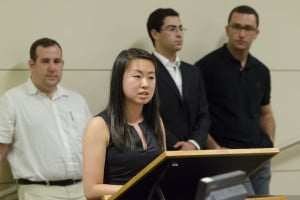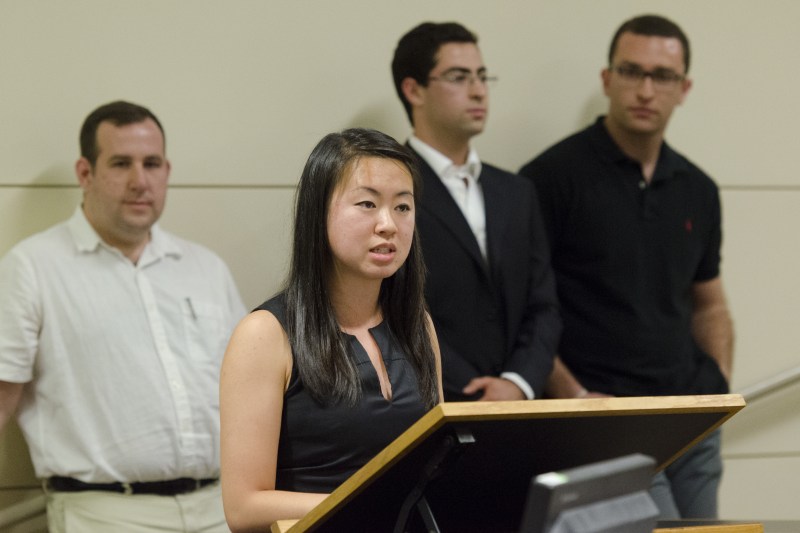The Faculty Senate heard reports from student representatives and voted on revisions to the Alternative Review Process (ARP), the University’s judicial procedure for cases involving sexual assault, at its meeting on Thursday.

David Palumbo-Liu, professor of comparative literature, opened the meeting by congratulating Adam Johnson, associate professor of English, on his recently acquired Pulitzer Prize and by applauding seven faculty members elected to the Academy of Arts and Sciences.
Provost John Etchemendy Ph.D. ’82 elaborated on an earlier announcement concerning a moratorium placed on the ability of Medical Center Line (MCL) faculty to purchase houses on campus. Etchemendy justified the moratorium by noting the lack of interaction between MCL faculty and undergraduate and graduate students, as well as MCL faculty members’ higher salary levels.
Shahab Fadavi ’15, the ASSU Undergraduate Senate’s representative to the Faculty Senate, spoke briefly about the Alternative Review Process, noting that the Undergraduate Senate had sought to reevaluate the University’s approach to sexual assault by creating an ad hoc committee to look at the ARP.
Fadavi reiterated the importance of listening to student feedback by noting the disappointment students have expressed this year at a lack of willingness by faculty and administrators to incorporate that feedback.
“I’d rather focus on the successes rather than the failures,” Fadavi said. “Late last quarter, an article was published in The Daily on shifting class times to 8:30 a.m. and banning double booking on classes. There was a huge uproar in the student community.”
Fadavi added that he met with Vice Provost for Undergraduate Education Harry Elam the next morning concerning this issue. Later that evening, Elam attended an open forum for students and faculty to express their opinions and pose questions concerning the issue.
“I think that should serve as a role model,” Fadavi said. “It helped to answer some questions. The following day, both The Daily and The Stanford Review wrote articles clearing up questions and misconceptions… I just wanted this to serve as a role model for other discussions faculty and students will have.”
Fadavi concluded by discussing the need for need-blind financial aid for international students, an issue he described as having widespread support amongst undergraduates at Stanford.
Outgoing ASSU President Robbie Zimbroff ’12 M.A ’13 discussed the importance of open communication between students and the administration, noting that both ASSU legislative bodies had approved students to serve on 50 committees across the University.
Zimbroff went on to reemphasis the significance of the process of soliciting student feedback to make revisions to the ARP.
Michael Shaw Ph.D. ’13, ASSU Graduate Student Council representative, discussed the importance of ensuring that other students and faculty are aware of the resources available to them on campus. He added that the rising cost of attending Stanford has divided the graduate community.
“It ought to be axiomatic that no student at Stanford feels undue financial stress,” Shaw said. “To that end, I ask the university to permanently return all graduate housing to graduate students, to guarantee all families campus housing, to subsidize the dependent health insurance the same as if they were postdocs or staff.”
Shaw concluded by asking faculty members to reach out to their students to ensure that they are aware of the resources and help available on campus.
Representatives of the Board of Judicial Affairs (BJA) subsequently spoke about the revisions to the ARP. Michele Dauber, professor of law and BJA co-chair, described the ARP as the process under which all allegations of sexual assault, sexual misconduct, sexual harassment, stalking, relationship abuse and dating violence are addressed.
“In 10 of the 13 years prior to the adoption of the ARP, Stanford didn’t have a single adjudication for any sexual assault or sexual violence,” Dauber said. “During that entire 13 year period, Stanford reported 175 cases of sexual offenses to the federal government under the Cleary Act, but only four cases went to a hearing and only two students were found responsible.”
Dauber added that it is impossible to know precisely how many assaults took place during those years and how many were committed by Stanford students, rather than people from off campus.
According to Dauber, through three years of the ARP pilot program, Stanford has had 53 reports of cases of sexual offenses, with 11 cases going to a hearing and seven guilty findings.
“We needed to create a new process because the Student Judicial Charter of 1997 was not designed to handle sexual assault cases,” Dauber said. “Some of the specific issues that we found to be inhibiting the use of the process by alleged victims were that our process was trial-like, it involved a cross-examination of the alleged victim by the alleged attacker, there was no right to appeal for the alleged victim and there was a high burden of proof needed for allegations… We wanted to make the process more open for students.”
In the pilot program, there are a series of private interviews, with each party listening to the other’s interview and responding with questions via email in real time. The process increased the number of reviewers from four to five, with three students and two faculty or staff members determining responsibility. The reviewers make their findings by using the preponderance of evidence standard, as suggested by federal guidelines. According to Dauber, the new process also allows for more opportunities to respond and appeal and provides more protection and confidentiality.
Jonathan York ’13, BJA co-chair, spoke about student involvement in the changes made to the ARP.
“[The new process] provides support and resources to students going through the process,” York said. “It also remains non-confrontational. Students have the opportunity to propose questions via email, which strengthens the rights of both parties.”
According to York, students cited a high level of engagement in the entire process of reviewing and changing the ARP, allowing victims to feel more comfortable.
During faculty questioning, Professor of Psychiatry and Behavioral Sciences David Spiegel asked about the sanctions proposed in the amendment and how the results are communicated to the community.
“The typical sanction for a sexual assault finding of responsibility is that the person found responsible has to be off campus for an average of three quarters and can’t be on campus until the victim graduates,” Dauber said. “We don’t reflect this on a transcript and don’t communicate the finding of responsibility to anyone, ever… The community does not know and should not know.”
Lauren Schoenthaler, a staff member on the BJA, added that there are certain professions for which applicants are asked whether they have a past disciplinary record, resulting in the information being released with a special written request.
The Faculty Senate unanimously approved the ARP, which will go before President John Hennessy for final approval.
The Senate will hear a panel discussion on the future of the Ph.D. program at the body’s next meeting on May 16. A discussion and vote of proposed class scheduling changes has been delayed until fall quarter.
